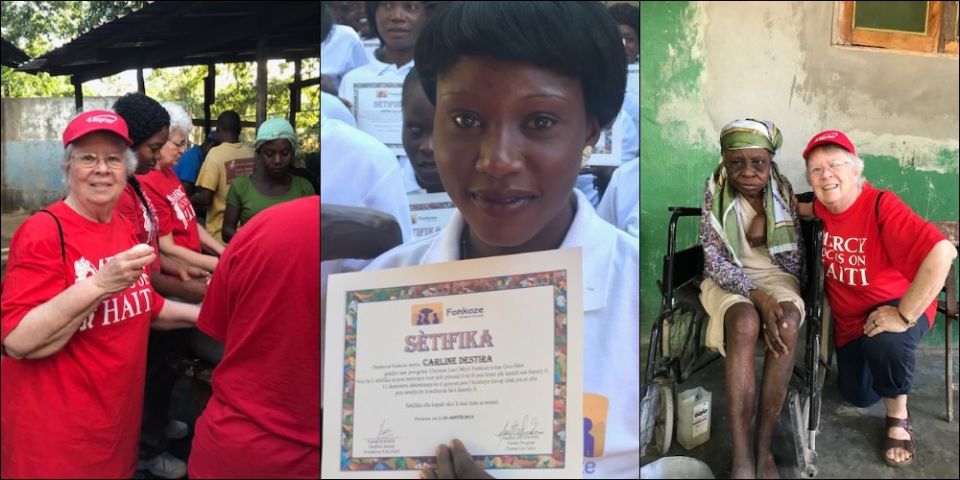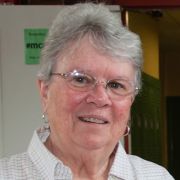Jarvis collage.jpeg

Let me tell you my story.
On Jan. 12, 2010, Haiti was hit by a catastrophic magnitude 7 earthquake, causing massive damage to a nation already suffering from decades of political, economic and social setbacks and inequalities. For 35 seconds, the earth shook, and the lives of millions of Haitians were changed forever.
A year later, in June 2011, the Sisters of Mercy of the Americas gathered in Chicago for an institute chapter meeting, to set community and ministry goals for the next six years. We were asking the God of mercy and wisdom to help us hear the call and understand the mission implied in the Direction Statement we were framing, which read in part:
Having listened deeply to the God who speaks in each of us and in this Chapter, we are led ... to liberate and redistribute our human and financial resources across the Institute and develop creative solutions to unmet needs, acting in solidarity with impoverished people.
On one of our days in Chicago, some sisters responded to a note posted on a bulletin board. It read: "If you are interested in joining a few others who have an interest in Haiti, please join us at lunch." A small group gathered; some of us, like Mercy Sr. Betty Scanlon of Philadelphia, had spent time in Haiti.
That day, Mercy Focus on Haiti, a ministry sponsored by the Sisters of Mercy of the Americas, was born. We were guided by the voice of God in our Direction Statement and by those who knew the suffering of the Haitian people.
The mission of the Sisters of Mercy of the Americas is expressed in our Constitutions, Article 3: "Recalling the word of Jesus that he is one with his suffering members, we respond to the cry of the poor. ... Through direct service and through our influence, we seek to relieve misery, to address its causes and to support all persons who struggle for full dignity."
In northern Haiti, Mercy Focus on Haiti has tried to respond to many human needs, relying on and affirming the desires and expertise of our Haitian partners.
Currently, we seek to address homelessness and hunger, at Maison Bon Samaritain, the Good Samaritan Home for the abandoned elderly in Gros Morne.
Through our Good Egg program, our contribution to school lunches, and our tuition assistance for ultra-poor students, we support the education and daily nutrition of children at Lekol Jezi-Mari, the Jesus and Mary Primary School founded in Fon Ibo by the Religious of Jesus and Mary.
In response to the pervasive need for clean water we now financially support the building of large cement cisterns (chato-dlos) in hillside neighborhoods, for soil protection, rainwater harvesting, water storage and piped water distribution to Haitian homes. We also support the reforestation and family vegetable gardening programs of our skilled agronomy partners. We pray that these and other ministries we assist will make a positive difference in the lives of many of our Haitian sisters and brothers.
Mercy Focus on Haiti is a simple organization, held together by the voluntary, part-time, but vigorous commitment of approximately 25 members: men and women, lay and religious, Sisters of Mercy, Mercy Associates and friends. I have the joy of being a member.
Advertisement
Advertisement
Let me tell you my story and one of the most moving experiences of my life. It illustrates what being a woman of Mercy in Haiti has meant to me.
On Jan. 24, 2019, I attended the graduation of 200 women in the Chemen Lavi Miyo program ("Pathway to a Better Life") in Gros Morne. It was this program that moved these women from ultra-poverty to independence. It was there I heard a woman say, "Today, I said goodbye to misery."
Having lived the life of a privileged woman and a respected religious in the U.S., I never had any idea what it is like to live in misery. But these women knew misery, and they had just spent 18 months trying to move from that misery to strength and courage. They stood tall that January day, because they could now feed their children every day, they had a safe, tin-roofed house to live in, and they had a future.
The "Pathway to a Better Life" is an empowerment program for ultra-poor Haitian women and their families. With help from partners like Mercy Focus on Haiti it is operated by Fonkoze, a Haitian financial and educational institution. With its 96% success rate, the program focuses on extremely poor, women-led families who are trying to live on $1.25 a day or less — who live in leaky one-room thatch huts, do not have daily food, and have no savings or regular source of family income.
Through the intensive 18-month Chemen Lavi Miyo program — which provides the weekly advice of a trained case manager and some initial financial assistance — these families improve their dwelling, construct an outdoor latrine, have food every day, and develop two microbusinesses (e.g., raising chickens, pigs or vegetables) to provide steady future income.
As each woman develops the financial means to raise her family out of extreme poverty, she realizes her own personal strength and capacity, and acquires confidence in her family's future well-being.
Mercy Focus on Haiti has made it possible — through fundraising — for 600 Haitian women to participate in the "Pathway to a Better Life" program: Four hundred have graduated; 200 more are currently in the program.
I, personally, have never gone hungry, except by choice — perhaps to be in solidarity with those who are poor or hungry — and always knowing I could eat whenever I wished. I don't think those actions are insincere or valueless, but I know they are not like the pain and fears of those who are truly hungry and weak from malnutrition.
After my experiences in Haiti, the question for me is always: "What must I do so that others do not have to be hungry? So that women can feed, clothe and send their children to school?"
What happened to me at that January 2019 graduation is still hard to explain. I know I cried through most of the ceremony. My tears are starting again as I remember the faces of women whose lives were changed. Their lives and mine still are very different. And yet, at that graduation, both our lives were changed.
When I heard them proudly say, "Now I have eight goats and six chickens," I thought of my own professed vow of poverty, and my feeble plan to "live more simply," and I could only praise God for those strong women who gave me example.
I am the woman I am today because of family, community and God's help. How little I can claim to have done on my own. But these women started with nothing, and today can say, "Now if someone asks me for something, I can give it to them." Their great joy is that now they can give, not just receive.
I hope I can continue to cry those tears, and clearly see what God is asking of me. Thank you, women of the Chemen Lavi Miyo program, for giving me the desire to be the woman of Mercy God has called me to be. You are my inspiration, guiding my "pathway to a better life." Mesi anpil. Thank you.
Like what you're reading? Sign up for GSR e-newsletters!


